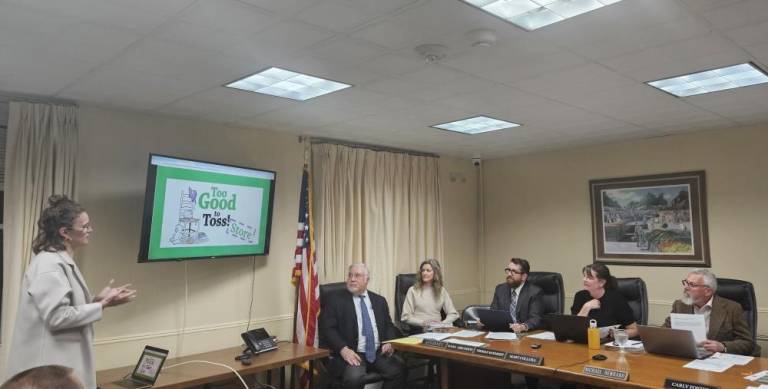Village considers extra ‘Too Good To Toss’ hub
Warwick. The board also discussed parking enforcement, grant service sharing, and the next short-term rental public hearing.

During the September 23 Warwick Village Board meeting, Village Trustee Thomas McKnight gave an update on Clean Energy Communities Grants, explaining that the CEC program is a non-competitive, state-sponsored grant program that awards grants based on a tiered system. Among the potential grants McKnight highlighted was an anticipated $50,000 grant that could be used for repurposing an out-of-use DPW trailer into a “Too Good To Toss” store.
Earlier in the meeting, Payton Swenson, one of the organizers of the annual Too Good To Toss event held at Stanley Deming Park, presented the case for the store. She showcased the popularity of the event, which serves a thousand people over two days, and the environmental benefits, noting that each year, it prevents 13 dumpsters’ worth of goods from being thrown away. Swenson referenced programs in Bedford and Newcastle, NY, as possible models for a Warwick program.
The board discussed the logistics of using the former DPW trailer, possible security concerns and where it should be located, with Swenson and the board noting the benefits of having it at Veterans Memorial Park. Warwick village attorney Stephen Gaba raised the issue of whether a Too Good To Toss store would be permitted on park land, clarifying that an event is not the same as a regular exchange of goods. Swenson noted that neither the Bedford or Newcastle goods exchanges were held on park land.
In addition, the board discussed how the store would be run, with Swenson suggesting that it would be open on weekends from May through September or October, including small events throughout the year, with the main event still held at Stanley Deming. She said that the goal was to have three to four volunteers work a three-hour shift once a week. Gaba mentioned potential issues with providing insurance for the volunteers and went over various ways to cover the cost.
Grant services
During the meeting Newhard addressed the town of Warwick’s proposal to share the cost of grant consulting services between itself and the villages of Florida, Warwick, and Greenwood Lake. As confirmed by Warwick Town Supervisor Jesse Dwyer in an email exchange, the town is considering retaining the firm Millennium Strategies for grant research and writing services. Dwyer said he believed it would benefit the three villages and proposed that each village contribute $9,333 each toward the yearly cost, with the town contributing $20,000 toward the remaining balance of the contract ($48,000). Dwyer noted that this would give each municipality full access to Millennium’s proprietary grants portal and access to all their staff and resources.
Referring to an email sent to him and the other village mayors regarding the town’s proposal, Newhard noted the response from Florida Mayor Daniel Harter Jr., claiming that the Florida Village Board had discussed the matter and determined it would be more comfortable contributing $5,000 to $6,000 toward the cost.
The Warwick Village Board discussed the number of grants Millennium would work on, the high cost of certain applications, as well as the complexities of certain grants that might go beyond the capabilities of that firm. They also spoke about how certain aspects of the proposal might be beneficial and wondered about the fairness of the proposed village contribution.
Parking enforcement
The Warwick Police Department will have an easier time issuing and enforcing tickets for vehicle violations thanks to new parking enforcement software. Trustee Barry Cheney explained that the new scanner device can input information from a vehicle’s registration barcode and add it to the ticket, which will be thermally printed and include a link to where the ticket can be paid online. In addition, the issuing officer can now add a photo of the violation onto the ticket, limiting potential disputes. Cheney said the software will be implemented beginning in October, sometime after Apple Fest.
The board also discussed adjusting the fines for parking violations, with Cheney saying that the current fees don’t always align with the severity of the violations. This prompted Trustee McKnight to share his concerns about angry people coming to Village Hall and perhaps incentivizing people to pay online, once the aforementioned system was in place, by potentially offering a discount for paying online or by mail.
In other parking news, the board continued its review of the village’s current all-night parking code, which prohibits vehicles from parking on all highways within the village between the hours of 2 a.m. and 6 a.m. from November 1 to April 1 of the following year. Cheney expressed his support for making the law more amiable to overnight parking, saying it would free up the police department to handle other issues and lessen the burden on residents. Trustee Mary Collura pointed out the challenge of households having to manage multiple cars and the inconvenience of having to ask another member of their household to move their car so they can pull their car into the driveway. She said it is often easier just to park on the street.
Newhard shared his concern about the limitations of village outreach and whether residents would have enough notice to move their vehicles ahead of a storm, should overnight parking be allowed except for during snow emergencies. He also wondered about potential challenges caused by more cars being parked on the roads when the plows are out.
Gaba said he would need to review whether the code could be changed by public hearing or via a resolution passed by the board. If a public hearing is required, the board noted, it may be challenging to implement a change ahead of the upcoming winter season.
Short-term rentals
After continuing its ongoing discussion on short-term rental code, the board scheduled a public hearing for October 21 to introduce the law and enable input from residents and other interested parties.